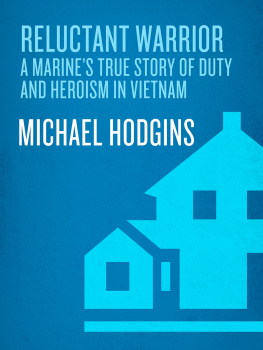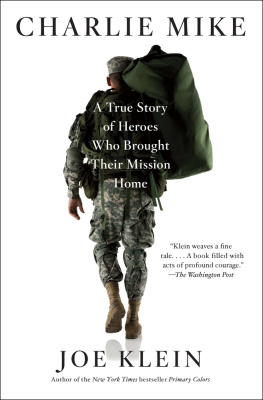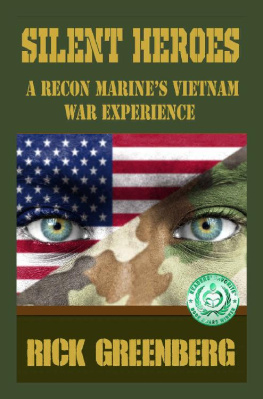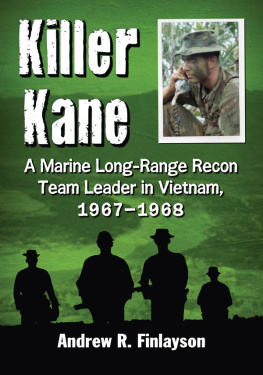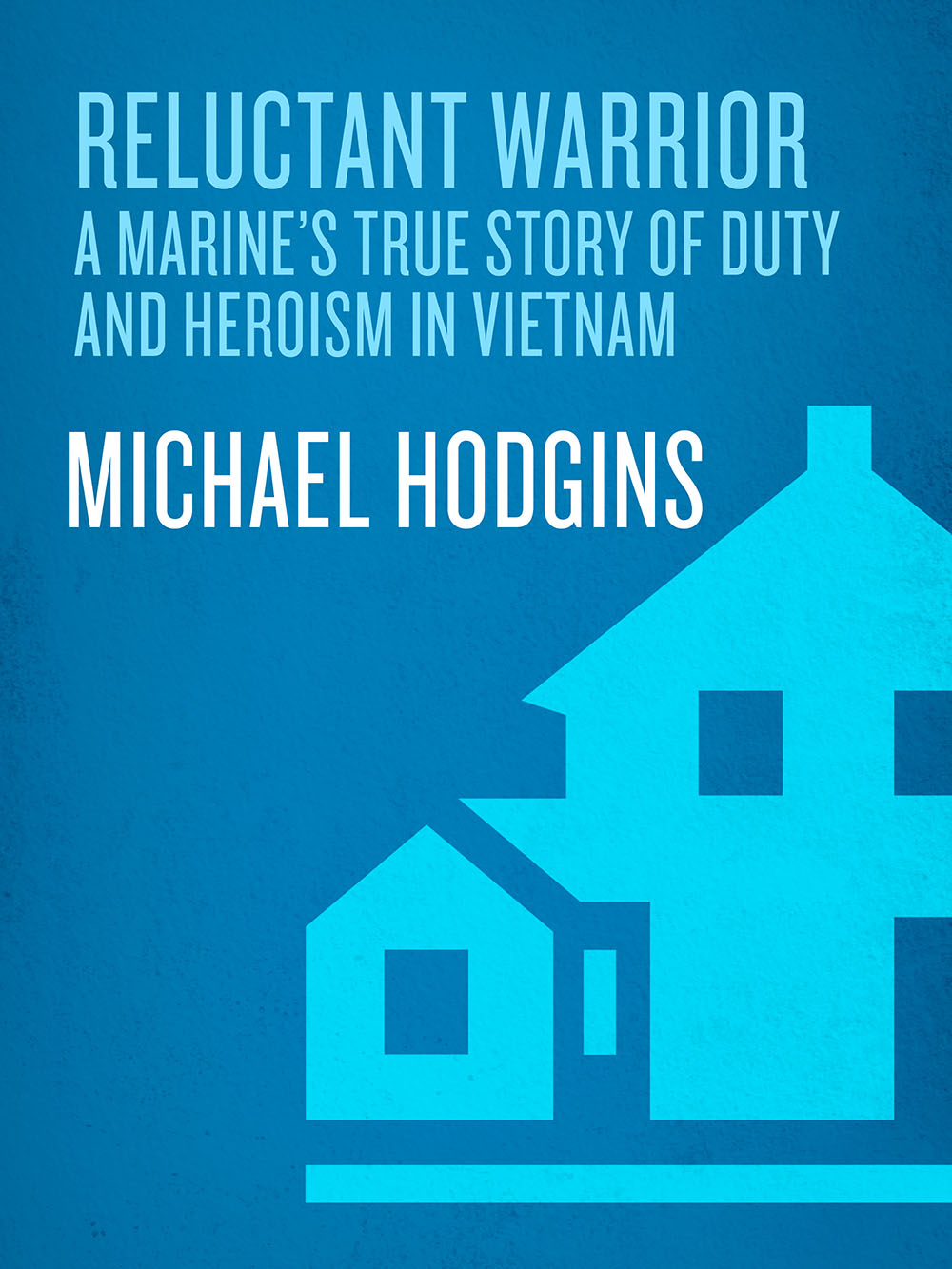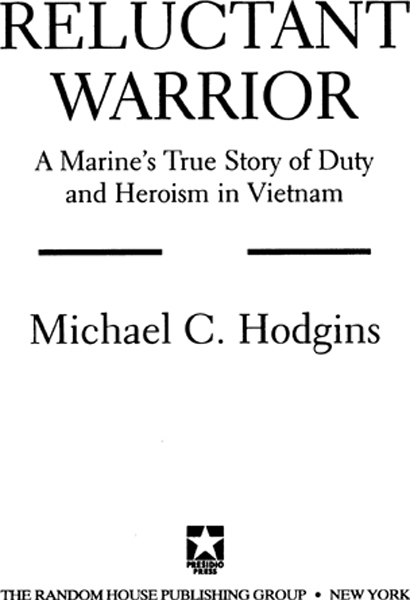PROLOGUE
Stranger, bear this message to the Spartans,
That we lie here obedient to their laws.
Epitaph, Thermopylae, 430 B.C .
Twenty-six years have passed since I served in Vietnam. Many books have been written by and about the young men who served in that tragic endeavor. In the minds of the public, stereotypes have been created, lessons have been taught, wisdom instilled. Yet the angst of the entire episode is only vaguely familiar to most Americans now living, summarized in the media as The Vietnam Experience. But, Vietnam was not an experience; it was a place. Many Americans, as young men, had formative experiences in that place sometime during the ten years that our servicemen fought there. Each was unique. Reluctant Warrior attempts to share with the reader the essence of one experience, mine, circa 1970. It is not a war story. It is not even about Vietnam, although the events recounted occurred there. Rather, this is a story about how things were when I was young and my Country was at war. It is a story about ordinary young men who did extraordinary things, together. It is a story about duty, about honor, about leadership. It is a story about moral courage, glory, and luck. It is a story about Marines.
As the title Reluctant Warrior suggests, I went to Vietnam with few illusions. Having served several years as an enlisted Marine, I well understood the undercurrents in the ranks. Upon reporting to OCS, I joined several hundred other young men seeking greater responsibility. We were volunteers, recruited from college campuses across the country, and from the enlisted ranks. The Marine Corps made each of us a promise: If you accept a commission in the United States Marines, we will shave your head and send you to Vietnam. Since one Marine in three was stationed in Vietnam at the time, it was a promise the Corps had no difficulty in fulfilling. Upon acceptance of the offer of a commission, each candidate took an oath to preserve and protect the United States of America from all enemies, foreign and domestic. We then commenced an arduous training program designed first to test our resolve and then to instill the knowledge we would need to succeed. Each young man embarked on what became, for those who survived, the most formative experience of his life. And we were challenged, literally, by enemies foreign and domestic. By 1970, a lieutenant of infantry stood an eighty percent chance of being wounded by enemy action before he finished his tour in the bush, and the Corps, like the other armed services, was confronting a deterioration of discipline in the ranks. At the Basic School, my instructors, with few exceptions, wore Purple Hearts among their decorations. Many were outpatients from Bethesda Naval Hospital, recovering from wounds so horrible that we made jokes to ease the tension of their presence among us. The statistics for friendly forces were no more encouraging. In Vietnam, Demeaning labor, boredom and bitterness led to drinking, drug abuse and fights in the rear, while in the bush arduous small unit activities were at once traumatizing and devoid of measurable success. In the words of one Marine general, It [the bush] appeared to sap the souls and the spirit of the men.* And no one, officer or enlisted, wanted to be the last unfortunate son to die in Vietnam.
But the violence of the late sixties was not confined to the battlefields of Vietnam. It was rampant on the streets of our Republic as well. The period 196575 was one of the most tumultuous in our Nations history. With the advent of television news, the war became a media event. Everyone was involved, made to feel at risk, vulnerable to tragedy. People took to the streets all across the country demanding an end to compulsory military service. Hell no! We wont go! and Ho, Ho, Ho Chi Minh! became mantras of the era, peoples wars the avante-garde movement of the time. Liberalisms heroes were such men as Che Guevarra, Fidel Castro, Mao Tse-tung and Ho Chi Minh, leaders of the enemy camp. Protests in the United States and around the world were led by student activists from the nations universities, the same universities that spawned the young leaders of the Armed Forces upon whom the scorn of the nation was heaped. In fact, the most vexing moral question confronting the graduating college seniors of the day was, to serve or not to serve in the Armed Forces of the United States. The decision, once confronted, became the comprehensive final exam in moral courage for young men of the sixties. It was a question of core values, patriotism, and moral courage. The system was there, riddled with loopholes for any who took the time or had the intelligence to investigate. In many quarters, it was considered smart to avoid, evade, even cheat the system. Most simply let fate deal their hand, as the system intended.
The decision changed us, those who served and those who did not. After twenty years, the moral issue is blurred in the body politic, but there is still a dichotomy. Those who chose not to serve did no wrong, for the law of the land did not require them to go in harms way. They had only to take their chance and do their duty if they were called. In fact, of the thirty-five million or so young men eligible for the draft during the war years, only about ten percent (3,500,000) actually endured the experience in any branch of service. But for each principled young man who chose to avoid or evade his duty, another, perhaps less privileged, went in his place. And while the vast majority of the young people who were called, by patriotism, economic necessity, or the draft, to serve in the Armed Forces during these years never saw an enemy or fired a round in anger, some did. Some died. Many were maimed. All returned to a Country devoid of empathy, changed forever by their experience.

